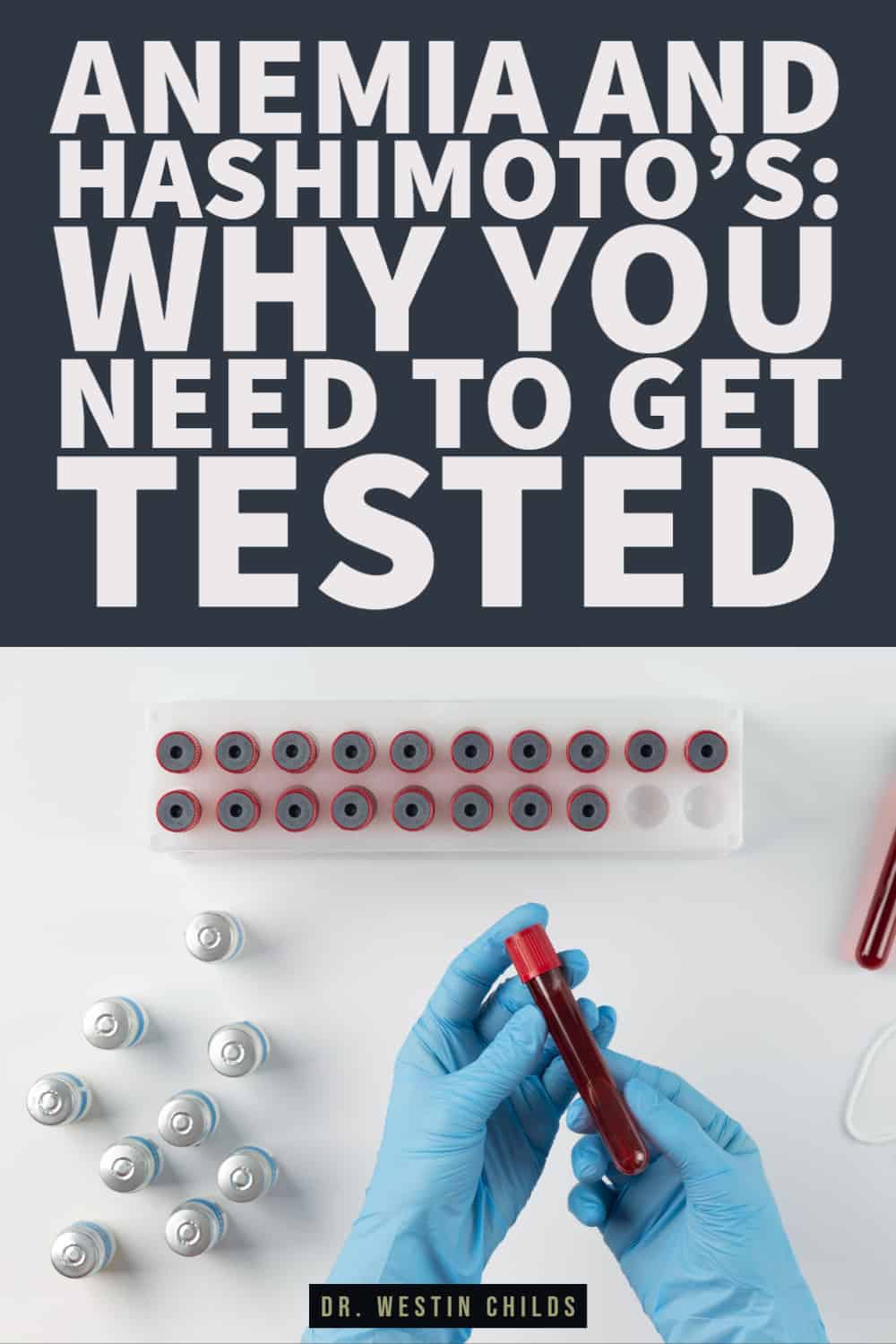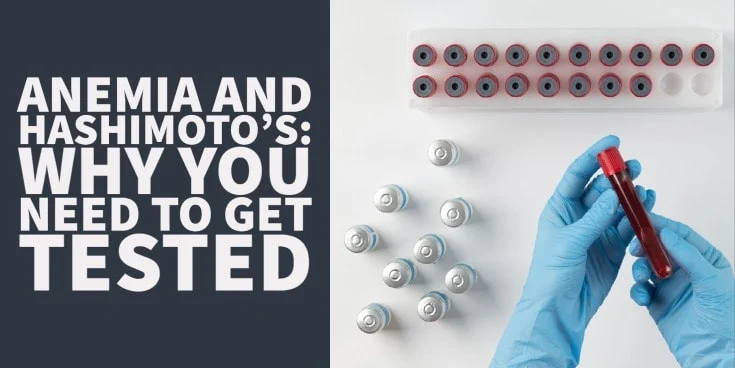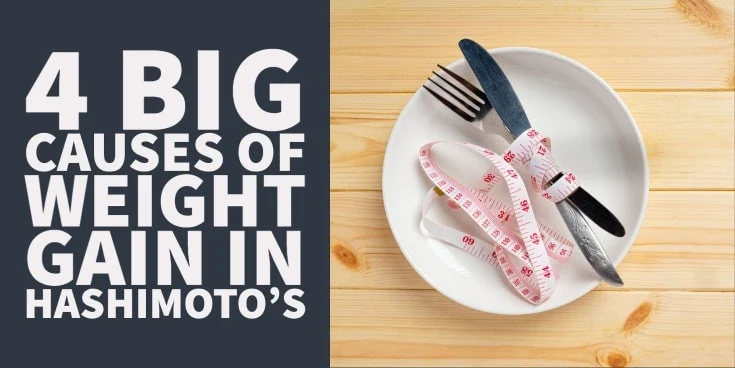There are a few things that can throw a wrench into your treatment plans if you have a condition like Hashimoto’s.
One of those is anemia.
And, believe it or not, anemia is often something that is misdiagnosed or missed completely (1) by both thyroid patients and doctors.
Why?
For a couple of reasons:
The first is that the symptoms of anemia and the symptoms of Hashimoto’s (and low thyroid disease) overlap.
Both conditions can lead to symptoms such as hair loss, fatigue, low energy, cold intolerance, leg cramps, decreased ability to exercise, and an overall decrease in quality of life.
Do these symptoms sound familiar?
If you are like many thyroid patients then there is a good chance you are familiar with some (or all) of those symptoms listed above.
The second reason anemia is often missed in patients with Hashimoto’s has more to do with how difficult it can be to diagnose the condition.
Full-blown anemia is rarely missed but more subtle changes in red blood cell volume (or iron levels, as the case may be) can still negatively impact how you are feeling and yet are easy to miss on standard testing.
This is further compounded by the fact that patients with Hashimoto’s can develop anemia from more than one cause.
This represents a diagnostic challenge for doctors which is why it’s often missed.
And that’s exactly why we are talking about this topic.
Today you will learn:
- What anemia is and why it’s a problem for thyroid patients, especially those with Hashimoto’s.
- The various ways that you can develop anemia and what they mean for your thyroid health.
- Which cases of anemia are often missed.
- How to test for anemia.
Let’s jump in…
DOWNLOAD FREE RESOURCES
Foods to Avoid if you Have Thyroid Problems:
I’ve found that these 10 foods cause the most problems for thyroid patients. Learn which foods you should avoid if you have thyroid disease of any type.
The Complete List of Thyroid Lab tests:
The list includes optimal ranges, normal ranges, and the complete list of tests you need to diagnose and manage thyroid disease correctly!
What is Anemia & Why It Matters For Your Thyroid
Before we talk about the causes of anemia let’s discuss more about anemia in general.
What is anemia?
Put simply, it’s defined as a state of insufficient red blood cells (2).
Why is this a problem?
Because these red blood cells carry oxygen to every cell in your body.
If you don’t have enough red blood cells then your ability to carry oxygen to your tissues, organs, and cells will be compromised.
Most cells in your body require these red blood cells because they need oxygen to create energy.
If you don’t have enough red blood cells then your oxygen delivery will be reduced which will then reduce energy production in your cells.
This cascade of problems results in the symptoms of anemia which can then negatively impact your thyroid.
There is a relationship between thyroid disease and red blood cell level but that relationship is not fully fleshed out yet.
What we know is that patients with thyroid disease are more likely to develop anemia compared to the average population and that replacing lost thyroid hormone levels can improve red blood cell levels and, therefore, the symptoms of anemia.
Low oxygen levels then impair thyroid function and action at the cellular level.
In this way, the relationship between anemia and thyroid function appears to be bidirectional (they both impact one another).
It’s a little more complicated than that, though, because just treating your thyroid doesn’t always fix anemia.
There are several ways that Hashimoto’s can lead to anemia (different types of anemia) and most of them must be treated separately from your thyroid.
In other words, if you think you can just focus on your thyroid while ignoring your red blood cell level, you are mistaken.
You need to keep an eye on both.
Causes of Anemia in Patients with Hashimoto’s
As I mentioned above, there are several causes of anemia.
Each of these conditions results in impaired oxygen-carrying capacity by the body either by directly impacting red blood cell levels or by altering how well they can do their job.
Some of these conditions don’t necessarily impact your red blood cell level but, instead, impact the structure of the red blood cell which in turn impacts its ability to do its job.
This is another reason why you need to be aware of the various causes of anemia if you have Hashimoto’s.
Some are easier to diagnose than others.
With this in mind, let’s talk about the causes of anemia that you should be aware of.
#1. Iron Deficiency Anemia
The first, and probably the most common, is called iron deficiency anemia.
Iron deficiency anemia stems from low iron and it’s frequently seen in women because of their menstrual cycle.
Iron is needed by your red blood cells to produce hemoglobin and hemoglobulin is the thing inside of your red blood cells that carries oxygen.
If you don’t have enough iron in your body then your bones will struggle to make enough red blood cells and you will develop anemia.
As red blood cell levels fall, you will see physical changes (paleness of the skin, lips, and hands) as well as changes in your symptoms (fatigue, cold intolerance, low energy, etc.).
Before iron deficiency causes anemia, though, it causes iron deficiency.
That may sound confusing but let me explain.
It actually takes quite a bit of iron loss before your body develops anemia because your body stores iron.
This iron storage can supplement what you may not be able to get for a short period of time before you develop full-blown anemia.
Iron happens to be very important for thyroid function because it’s required by a specific protein to create thyroid hormone in the thyroid gland (3).
This enzyme, known as thyroid peroxidase, is dependent upon iron to function optimally.
Low iron states impair its ability to create thyroid hormone which impairs thyroid function.

To make matters worse, low thyroid states impair the absorption of iron in the intestinal tract!
As a result, there are a lot of thyroid patients out there walking around with suboptimal iron levels who DON’T have anemia (yet) but are still suffering from the symptoms associated with low iron.
This is a problem I’ve discussed before but is relevant here because even though low iron doesn’t always cause anemia it will almost always impair thyroid function.
When iron deficiency gets bad enough, though, it will cause anemia.
When that happens you will start to see the physical exam findings I mentioned above and you will see changes in your red blood cells.
I will go over what to look for and how to test for the various types of anemia later in this article but for now, I just wanted to introduce the idea.
Patients with Hashimoto’s are more likely to develop iron deficiency anemia for several reasons including:
- Decreased absorption of iron in the intestinal tract due to hypothyroidism – Low thyroid states alter stomach acid production which impairs the absorption of many nutrients including iron (4). This issue alone is enough to result in suboptimal iron states.
- Women’s menstrual cycle – Women get Hashimoto’s more frequently than men due to their hormone profiles which means there are a lot more women with Hashimoto’s compared to men. Women also consistently lose iron through their menstrual cycle which occurs regularly. Any loss of blood will result in a loss of iron which must then be replaced. Even a small but consistent loss of blood every month, when combined with decreased iron absorption from thyroid disease, is enough to slowly push someone into iron deficiency territory.
- Specialty diets used to treat autoimmune diseases may not have enough iron – Many patients with Hashimoto’s turn to different diets to help control their symptoms and immune system. Changing your diet can definitely help your thyroid (I’ve written about this before) but it may come at the cost of causing certain nutrient deficiencies, including iron. Iron-rich foods include meat, fish, and beans, so if your diet restricts these food groups then you should keep an eye on your iron status (this is a good idea for all thyroid patients).
#2. Vitamin B12 Deficiency Anemia
You may not realize it but your body needs B12 for more than just energy production.
Vitamin B12 is also important for the overall health of your red blood cells and severely low B12 can lead to anemia (5).
Anemia associated with vitamin B12 deficiency isn’t as common as other types of anemia that we are discussing today but it’s still important.
When your body doesn’t get enough vitamin B12 it is unable to create healthy red blood cells.
While you may have a normal or even healthy number of red blood cells, the red blood cells floating around can’t effectively do their job.
The result is the inability to hold and carry oxygen to the tissues that need it.
B12 deficiency anemia is rarer than iron deficiency anemia because it’s easier to catch and treat before it develops into full-blown anemia.
If you think about it, you’re probably consuming a fair amount of vitamin B12 which has been added to drinks and foods even if you aren’t taking a formal B complex or vitamin B12 supplement.
As a result, most patients with Hashimoto’s have enough vitamin B12 to prevent anemia but not enough that they thrive.
But even if your B12 status isn’t causing anemia, it’s still important to be aware of so that you can ensure it doesn’t become a problem for you down the road.
Just like iron, patients with Hashimoto’s are more likely to develop vitamin B12 deficiency because of the impact that thyroid hormone has on the intestinal tract.
This can stem from the direct impact that thyroid hormone has on acid production in the stomach or because those with Hashimoto’s are more likely to develop another condition called autoimmune gastritis.
#3. Autoimmune Gastritis and Pernicious Anemia
Autoimmune gastritis is an autoimmune disease of the stomach that results in atrophy and damage to the intestinal lining and special cells in the stomach called parietal cells.
These parietal cells produce a protein called intrinsic factor which is something your body uses to absorb vitamin B12.
If you damage your parietal cells (for any reason) then you will also limit your ability to absorb vitamin B12.
Autoimmune gastritis is, therefore, a common cause of vitamin B12 deficiency and another type of anemia called pernicious anemia (we will talk more about this in a minute).
The reason that patients with Hashimoto’s suffer from these two conditions is quite simple:
Both are autoimmune diseases and they tend to go together.
Studies have shown that Hashimoto’s is one of if not the most common autoimmune diseases and as many as 40% of patients with Hashimoto’s (6) suffer from stomach-related disorders (such as autoimmune gastritis).
Not all 40% of patients will get autoimmune gastritis, but some percentage of that 40% definitely do.
This is an issue not only for vitamin B12 deficiency anemia but also for other nutrients that your body and thyroid need.
We aren’t spending a lot of time on those nutrients that don’t cause anemia (that’s the topic of this article) but you can read more about why they are important here.
How do you know if you have autoimmune gastritis?
It’s actually more difficult than you might think to diagnose.
The symptoms associated with autoimmune gastritis are very non-specific and include things like nausea, vomiting, stomach pain, fatigue, lack of appetite, iron deficiency anemia, vitamin B12 deficiency anemia, and other nutrient deficiencies.
As you can see, the symptoms tend to be non-specific so one of the main ways to diagnose the condition must be that you are aware of it.
When you combine awareness with the association of vitamin B12 anemia and/or iron deficiency anemia, making the diagnosis is a lot easier.
And this is where pernicious anemia steps into play.
Pernicious anemia is a specific type of vitamin B12 anemia that results from a lack of intrinsic factor.
Without getting too complex, it’s more of a way to define the type of anemia (7) than anything else.
Even though autoimmune gastritis can cause pernicious anemia (due to vitamin B12 deficiency) it can also cause iron deficiency due to decreased iron absorption.
That’s because atrophy to the stomach will impact more than just vitamin B12 absorption.
For this reason, you need to keep an open mind about the possibility of autoimmune gastritis if you have any sort of anemia related to nutrient deficiencies.
#4. Anemia of Chronic Disease
Lastly, we have another type of anemia called anemia of chronic disease.
This type of anemia is different from those that we have discussed so far because it doesn’t result from deficiencies in vitamin B12 or iron.
It does however impact your body’s ability to utilize iron, and that’s the problem here.
Anemia of chronic disease occurs in patients that have chronic medical conditions or autoimmune diseases for more than 3 months.
This type of anemia is caused by chronic inflammation and the impact that inflammation has on your body’s ability to utilize iron.
Anemia of chronic disease is more common with more severe autoimmune diseases such as rheumatoid arthritis, systemic lupus erythematosus, vasculitis, sarcoidosis, and inflammatory bowel disease, but it still can occur in those with Hashimoto’s and is the second most common type of anemia.
Unfortunately, anemia of chronic disease often overlaps with iron deficiency anemia (8) (the most common cause of anemia) so in reality, you may have a combination of both conditions.
This can obviously make diagnosing the condition difficult.
In anemia of chronic disease, your body locks away iron inside of it so it can’t be used to create red blood cells.
If this happens to a significant degree, then you will become anemic and your red blood cell levels will drop.
You can often differentiate between iron deficiency anemia and anemia of chronic disease based on iron lab tests and iron storage.
It’s not quite that simple, though, because they often overlap as I mentioned above.
The treatment for anemia of chronic disease is to focus on the underlying cause which, in this case, means treating your thyroid.
By reducing the inflammatory process which is damaging your thyroid, you should be able to liberate the iron already in your body and solve the anemia problem at the same time.
You can learn more about focusing on more than just your thyroid if you have Hashimoto’s here.
How To Test For Anemia If you have Hashimoto’s
Now that you have a pretty good idea as to what causes anemia, let’s talk more about diagnosing it.
As I mentioned, full-blown anemia isn’t often missed because testing for it is pretty standard when you go to see your doctor.
Your doctor will almost always order what is called a complete blood count which lets you know if you have enough red blood cells.
Even though full-blown anemia doesn’t often get missed, more subtle changes to thyroid function, iron lab tests, and nutrient deficiencies do.
So even if you don’t have anemia, it’s still a good idea to keep an eye on these tests to make sure that you fall into the optimal ranges.
It’s also important to check these lab tests if you are just someone who is continuing to experience low thyroid symptoms despite doing everything else correctly.
Testing for anemia isn’t hard, as long as you know what to look for.
Here are several tests that you can use to diagnose anemia:
- Complete blood count – This test is an easy way to tell if you have enough red blood cells in your body and what your hematocrit is. If you have low red blood cells or a low hematocrit then the diagnosis of anemia is obvious. What isn’t obvious, though, is the cause. The complete blood count also gives you a lot of additional information about the size and shape of your red blood cells which can help determine the cause of anemia. No matter what, this is a test that you need to get.
- MCV – MCV, which stands for mean corpuscular volume, is found in the complete blood count and gives you information about the size of your red blood cells. A low MCV means you have small red blood cells and is often seen in iron-deficient states. A high MCV means that your red blood cells are, on average, big, and may indicate folate deficiency or vitamin B12 deficiency.
- Serum iron studies – Serum iron studies like TIBC (total iron binding capacity), serum iron, ferritin, and percent saturation, tell you whether your body has enough iron or not. Obviously, low iron states when combined with low red blood cells would indicate iron deficiency anemia. You’ll need to get your iron lab tests, though, regardless of the cause of anemia to make sure you rule out iron deficiency anemia and to help diagnose anemia of chronic disease.
- Inflammatory markers – Inflammatory markers, such as ESR and CRP, can help you determine if you have inflammation in your body. Chronic inflammation is the hallmark of anemia of chronic disease which is why these tests are helpful and necessary. You’ll also get additional value from these tests if you have Hashimoto’s as well.
- Vitamin B12 levels – You’ll want to test for your vitamin B12 status to rule out vitamin B12 deficiency anemia. Unfortunately, it’s harder than you might think to diagnose B12 deficiency with lab tests because many of the available tests are inaccurate. For more accurate testing avoid the serum vitamin B12 lab tests and instead use the MMA (methylmalonic acid) lab test.
- Thyroid function lab tests – If you have anemia and Hashimoto’s then you might as well test your thyroid when you are getting these other lab tests mentioned here. This will help you understand if your low thyroid is contributing to the absorption of nutrients or if your anemia is caused by something completely different.
- Biopsy of the stomach and/or endoscopy (9) – Lastly, you may ultimately need to get more invasive testing done like a biopsy of the stomach or an upper endoscopy. A biopsy of the stomach may be necessary to diagnose causes of anemia like autoimmune gastritis. An upper endoscopy is necessary to get down to the stomach so you’ll probably have both done at the same time. You don’t need to start with these tests, though, as it’s much easier to start with blood tests than it is with these more invasive tests. They will probably only be necessary if the information you get from the blood tests is confusing or unclear.
Final Thoughts
Have Hashimoto’s? Then anemia is something you should be aware of.
There are many different types and causes of anemia and patients with Hashimoto’s are more likely to develop all of them.
The more common types of anemia include iron deficiency anemia and anemia of chronic disease but you can’t forget about vitamin B12 deficiency anemia and pernicious anemia from autoimmune gastritis.
If you aren’t feeling at 100% despite doing everything else correctly then it would be worth exploring anemia as a potential cause of those persistent symptoms.
Even if you don’t uncover an obvious cause of anemia, you are still likely to find some nutrient deficiencies along the way.
Now I want to hear from you:
Do you have both Hashimoto’s and anemia?
If so, do you know what type of anemia you have or what caused it?
Do you have Hashimoto’s and iron deficiency or vitamin B12 deficiency?
Are you planning on getting any of the tests mentioned above?
Leave your questions or comments below!
Scientific References
#1. ncbi.nlm.nih.gov/pmc/articles/PMC6179176/
#2. ncbi.nlm.nih.gov/books/NBK499994/
#3. academic.oup.com/jn/article/132/7/1951/4687383
#4. pubmed.ncbi.nlm.nih.gov/12801042/
#5. nhlbi.nih.gov/health/anemia/vitamin-b12-deficiency-anemia#
#6. ncbi.nlm.nih.gov/pmc/articles/PMC5405068/
#7. ncbi.nlm.nih.gov/books/NBK540989/
#8. ncbi.nlm.nih.gov/pmc/articles/PMC5588399/
#9. pubmed.ncbi.nlm.nih.gov/16544728/








